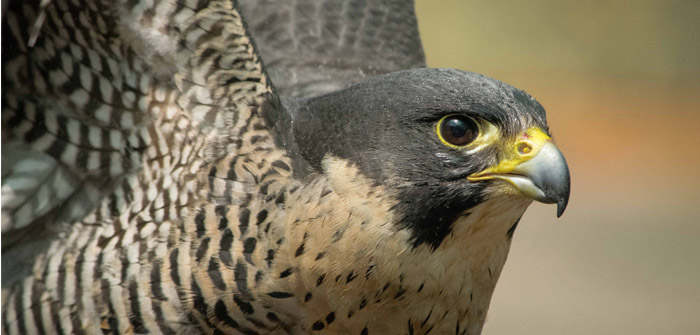(The peregrine falcon is an Endangered Species Act success story. This raptor was delisted in 1999. People can see a peregrine falcon during High Desert Museum programs like the summertime Raptors of the Desert Sky | Photo courtesy High Desert Museum)
What do a 100-pound chinook salmon, ten-inch-tall pygmy rabbit and vibrant San Rafael cactus all have in common?
Under the Endangered Species Act (ESA) — a half-century-old law that aims to protect vulnerable species from extinction — all three of these species are currently classified as endangered in some regions of the High Desert. Defined by the ESA, an endangered species is one that is “in danger of extinction throughout all or a significant portion of its range.”
Opening on November 11, the High Desert Museum’s Endangered in the High Desert exhibition will call attention to species in the region that are either facing or recovering from the threat of extinction. This intriguing and informative exhibition is a component of the Museum’s yearlong exploration of the Endangered Species Act, 50 years after it passed unanimously in the Senate and by a vote of 355-4 in the House of Representatives. President Richard Nixon signed it into law.
“Fifty years later, the Endangered Species Act continues to be an influential law that has generated a significant amount of dialogue in its time,” says Executive Director Dana Whitelaw, Ph.D. “We look forward to exploring this significant legislation and its many complexities in the High Desert region.”
Visitors will first encounter a floor-to-ceiling map introducing many of the exhibition’s ambassador species — 24 of the 29 featured species that represent the many listed, delisted and at-risk but not yet listed species in the High Desert — and their locations in the region. A playful mural of the High Desert landscape details each of the ambassador species. This massive mural splits into four distinct sections, first differentiating between endangered, threatened and delisted species at the state and federal levels. The fourth section asks guests to consider the future of several species in the area, including the monarch butterfly, western bumble bee and Pacific lamprey.
With vibrant colors and engaging photography, this exhibition is meant to ignite conversations about these plants and animals — including lesser-known species like the whitebark pine and the Oregon spotted frog — while also calling attention to the ecological connectivity within the greater ecosystem.
“Species depend on access to healthy habitat to survive” says Donald M. Kerr Curator of Natural History Hayley Brazier, Ph.D. “In designing the exhibit, we wanted to depict plants and animals in the context of landscapes and waterscapes. The exhibit’s images and murals convey that endangered species conversation does not happen in a vacuum; the broader ecosystems matter.”
After Museum visitors experience the brand-new Endangered in the High Desert exhibition, they can encounter a handful of the ambassador species in-person. Just a short walk from the exhibition, a bald eagle — a delisted species — lives in the Museum’s care. Six threatened and delisted species currently live in the Museum’s care: the bull trout, Foskett speckled dace, steelhead trout, peregrine falcon, bald eagle and desert tortoise. Small signs placed throughout the Museum will distinguish between these species and others living on Museum grounds.
Endangered in the High Desert is part of a yearlong series of exhibitions and public programs at the Museum to explore and reflect on the ESA’s impact in the High Desert and beyond. This includes the current exhibition Wolves: Photography by Ronan Donovan, open through February 11, 2024, as well as Andy Warhol’s Endangered Species: From the Collections of Jordan D. Schnitzer and his Family Foundation, which opens Saturday, December 9.
Endangered in the High Desert will be on display through July 7, 2024. This exhibition is made possible by the Visit Central Oregon Future Fund and the James F. and Marion L. Miller Foundation, with support from DoubleTree Hilton and Waypoint Hotel. Learn more at highdesertmuseum.org/endangered-high-desert.
About The High Desert Museum:
The High Desert Museum opened in Bend, Oregon in 1982. It brings together wildlife, cultures, art, history and the natural world to convey the wonder of North America’s High Desert region. The Museum is a 501(c)3 nonprofit organization accredited by the American Alliance of Museums, is a Smithsonian Affiliate, was the 2019 recipient of the Western Museums Association’s Charles Redd Award for Exhibition Excellence and was a 2021 recipient of the National Medal for Museum and Library Service.

